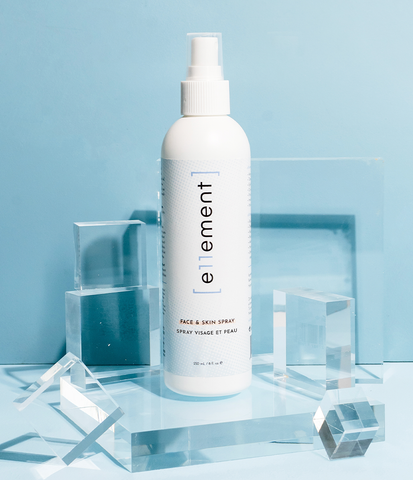Eczema is a common skin condition that affects millions of people worldwide. It causes dry, itchy, and inflamed patches of skin that can be incredibly uncomfortable. For those suffering from eczema, finding an effective, natural solution is often a top priority. This is where hypochlorous acid spray comes into play, offering a promising treatment option that’s both gentle and effective.

Eczema, also known as atopic dermatitis, is a chronic condition that leads to red, inflamed,and itchy skin. The exact cause of eczema remains unclear, but it is believed to be linked to a combination of genetic and environmental factors. Common triggers include allergens, stress, and irritants like harsh soaps or fabrics.
Eczema can be particularly challenging to manage due to its recurring nature. Many treatments are available, from topical steroids to moisturizing creams, but not all are suitable for long-term use. Some treatments can cause side effects, especially with prolonged use, making the search for a natural and effective alternative crucial.
What is Hypochlorous Acid?
Hypochlorous acid (HOCl) is a naturally occurring substance produced by the body's immune system. It plays a critical role in fighting off infections and promoting healing. In recent years, hypochlorous acid has been formulated into sprays and other topical treatments, offering a natural solution for various skin conditions, including eczema.
The Science Behind Hypochlorous Acid
Hypochlorous acid is a mild, non-toxic substance that has strong antimicrobial properties. It works by disrupting the cell walls of bacteria, viruses, and fungi, effectively neutralizing them. Unlike harsher chemicals, hypochlorous acid is gentle on the skin, making it an ideal option for those with sensitive skin or chronic conditions like eczema.
How Hypochlorous Acid Spray Helps with Eczema
Hypochlorous acid spray can be a valuable tool in managing eczema for several reasons:
- Antimicrobial Properties: One of the key benefits of hypochlorous acid spray is its ability to kill harmful bacteria and other pathogens on the skin. This is particularly important for eczema sufferers, as open sores and scratches can easily become infected.
- Reduces Inflammation: Eczema is characterized by inflamed, irritated skin. Hypochlorous acid has anti-inflammatory properties that help reduce redness and swelling, providing relief from the discomfort associated with eczema flare-ups.
- Promotes Healing: Hypochlorous acid supports the body’s natural healing process by encouraging tissue repair. Regular use of hypochlorous acid spray can help speed up the recovery of damaged skin, reducing the duration and severity of eczema flare-ups.
- Gentle on the Skin: Many eczema treatments can be harsh, especially for those with sensitive skin. Hypochlorous acid spray is non-irritating and safe for all skin types, making it a suitable option for long-term use.
Using Hypochlorous Acid Spray for Eczema Treatment
Incorporating hypochlorous acid spray into your eczema treatment routine is simple. Here’s how you can use it effectively:
Step 1: Cleanse the Affected Area
Before applying hypochlorous acid spray, gently cleanse the affected area with a mild, fragrance-free soap and water. Pat the skin dry with a soft towel.
Step 2: Apply the Hypochlorous Acid Spray
Spray a generous amount of hypochlorous acid directly onto the affected area. Allow it to air dry for a few minutes to ensure the skin absorbs it fully. There's no need to rinse off the spray.
Step 3: Moisturize
After the spray has dried, follow up with a hypoallergenic moisturizer to lock in moisture and further protect the skin barrier. This step is crucial in managing eczema, as keeping the skin hydrated can help prevent flare-ups.
Benefits of Choosing Hypochlorous Acid Spray
Opting for hypochlorous acid spray as part of your eczema care routine offers several benefits:
A Natural and Safe Alternative
Hypochlorous acid is a naturally occurring substance in the body, which means it is biocompatible and safe for use on the skin. Unlike some synthetic treatments, hypochlorous acid spray is free from harsh chemicals, making it a safer alternative for long-term use.
Versatility and Ease of Use
Hypochlorous acid spray isn’t just for eczema. It can also be used to treat other skin conditions, such as minor cuts, burns, and infections. Its ease of use—simply spray and go—makes it a convenient option for daily skin care.
Minimal Side Effects
One of the significant advantages of hypochlorous acid spray is its minimal side effects. Because it is gentle and non-irritating, it is suitable for people with sensitive skin or those who cannot tolerate stronger treatments.
Real-Life Success Stories
Many individuals with eczema have reported positive results after incorporating hypochlorous acid spray into their skincare routine. They have experienced fewer flare-ups, reduced itching, and faster healing times. These success stories highlight the potential of
Considerations When Using Hypochlorous Acid Spray
While hypochlorous acid spray is generally safe and effective, there are a few considerations to keep in mind:
Patch Test First
As with any new skincare product, it’s essential to perform a patch test before applying hypochlorous acid spray to a larger area. This ensures that your skin does not react negatively to the product.
Consult with a Dermatologist
If you have severe eczema or are using other treatments, it’s a good idea to consult with a dermatologist before adding hypochlorous acid spray to your routine. They can provide guidance on how to best incorporate it into your existing treatment plan.
Conclusion: Hypochlorous Acid Spray as a Natural Eczema Solution
Eczema can be a challenging condition to manage, but with the right tools, relief is possible. Hypochlorous acid spray offers a natural, gentle, and effective solution for soothing eczema symptoms and promoting healthier skin. By reducing inflammation, preventing infection, and supporting the skin’s natural healing process, hypochlorous acid spray can be a valuable addition to your eczema care routine.























